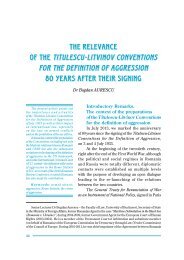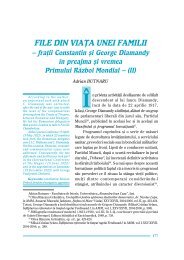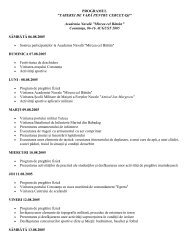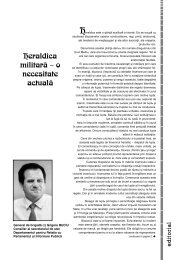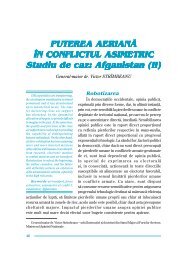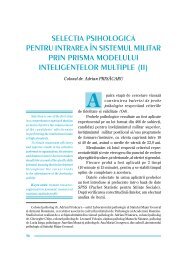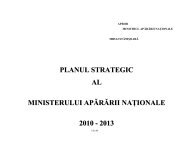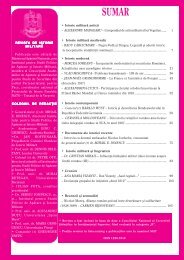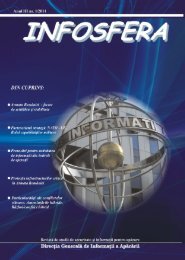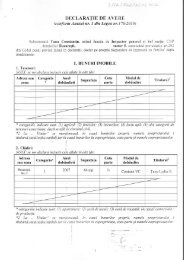You also want an ePaper? Increase the reach of your titles
YUMPU automatically turns print PDFs into web optimized ePapers that Google loves.
was not harmed by the new regime. Greece unsuccessfully<br />
tried, yet without putting too much effort,<br />
to obtain in exchange the fortification of the Greek<br />
islands that had been disarmed following the<br />
Lausanne convention, such as Lemnos, Chios,<br />
Mytilene, as a safety measure at the entrance in<br />
the Straits. 14<br />
During the interwar period, closed relations of<br />
cooperation in numerous fields developed between<br />
Romania and Greece, both of whom were, in a<br />
certain sense, a model for the entire region. These<br />
relations materialized themselves in several initiatives,<br />
the most important being the Balkan Pact, a<br />
defensive regional alliance whose goal was to preserve<br />
the political and territorial statu-quo. As for<br />
the issues in the Black Sea, they represented a<br />
point of convergence in the Greco-Romanian relations,<br />
both countries situating themselves on the<br />
same position at Lausanne and Montreux. It must<br />
be added that the significance of the Black Sea<br />
was different at Bucharest and Athens, Romania<br />
being a Black Sea country and Greece a Mediterranean<br />
country. Consequently, the two diplomacies<br />
promoted mainly their interests in these maritime<br />
areas. But, when these interests overlapped,<br />
Romania and Greece succeeded to find ways of<br />
communication which amplified the bilateral cooperation.<br />
1 For the geopolitical aspects in the Black Sea,<br />
see the Central National Archives of History, fund<br />
Brătianu family, file no. 506. (The course on the Black<br />
Sea after the Ottoman conquest taught by Gheorghe<br />
I. Brătianu at the University of Bucharest, 1941-1942);<br />
Georgios Prevalakis, Balcanii. Cultură şi geopolitică,<br />
foreword by the author in the Romanian edition, translation,<br />
notes and afterword by Nicolae-Şerban<br />
Tanaşoca, Publishing House Corint, Bucharest, 2001;<br />
Charles King, Marea Neagră. O istorie, translation by<br />
Dorin Branea and Cristina Chevereşan, Publishing<br />
House Brumar, 2005.<br />
2 For the events in the Balkan Peninsula and Asia<br />
Minor in the period 1919-1922, see, among others,<br />
Arnold J. Toynbee, The Eastern Question in Greece<br />
and Turkey, second edition, Howartig Fertig, New<br />
York, 1970; Misha Glenny, The Balkans 1804-1999.<br />
Nationalism, War and Great Powers, Granata Books,<br />
London, 1999, p. 378-396; Georges Corm, Europa şi<br />
Orientul. De la balcanizare la libanizare. Istoria unei<br />
modernităţi neîmplinite, Romanian translation by<br />
Ileana Rotund, foreword by Claude Karnoouh, Publishing<br />
House Dacia, Cluj-Napoca, 1999, p. 105-111;<br />
Barbara Jelavich, Istoria Balcanilor. Secolul al XX-lea, translation<br />
by Mihai Eugen Avădanei, afterword by Ion<br />
Ciupercă, Institutul European, vol. 2, Iaşi, 2000, p.<br />
120-126, etc.<br />
3 Among the papers on the Conference of<br />
Lausanne, there must be mentioned: Ali Fuad, La<br />
question de Détroits. Ses origines, son évolution, sa<br />
solution à la Conférence de Lausanne, Paris, 1928;<br />
Nicolae Daşcovici, Marea Neagră sau regimul<br />
Strâmtorilor, Iaşi, 1937; Paul Gogeanu, Strâmtorile<br />
Mării Negre de-a lungul istoriei, Bucharest, 1966;<br />
Nicolae Titulescu, Documente diplomatice, Bucharest,<br />
1967; Ilie Seftiuc, Iulian Cârţână, România şi<br />
problema Strâmtorilor, Publishing House Ştiinţifică,<br />
Bucharest, 1974; Gheorghe N. Căzan, Problemele<br />
Orientului Apropiat de la războiul mondial la Conferinţa<br />
de pace de la Lausanne, in Relaţii internaţionale în<br />
perioada interbelică, Bucharest, 1980; Eliza Campus,<br />
Din politica externă a României. 1913-1947, Bucharest,<br />
1987, etc.<br />
4 I.G. Duca, Memorii, volume IV, Războiul, partea<br />
a II-a (1917-1918), edition and index by Stelian Neagoe,<br />
Publishing House Machiavelli, Bucharest, 1994,<br />
p. 262.<br />
5 Charles and Barbara Jelavich, Formarea statelor<br />
naţionale balcanice. 1804-1920, translation by Ioan<br />
Creţiu, foreword and peer review by professor Camil<br />
Mureşan, Publishing House Dacia, Cluj-Napoca, 2002,<br />
p. 365.<br />
6 Nicolae Daşcovici, op. cit., p. 169.<br />
7 Jean Baptiste Duroselle, Istoria relaţiilor<br />
internaţionale, vol. I, 1919-1939, translation by Anca<br />
Airinei, Publishing House Ştiinţelor Sociale şi Politice,<br />
Bucharest, 2006, p. 80.<br />
8 Ministry of Foreign Affairs Archive, fund 71/<br />
Greece (1920-1944), volume 35, f. 16.<br />
9 Among the papers on the establishment and<br />
evolution of the Balkan Pact, there must be mentioned:<br />
Cristian Popişteanu, Antanta Balcanică.<br />
Momente şi semnificaţii, second edition, Bucharest,<br />
1971; Eliza Campus, Înţelegerea Balcanică, Bucharest,<br />
1972; Alexandru Oşca, Gheorghe Nicolescu, Tratate,<br />
convenţii şi protocoale secrete (1934-1939), Publishing<br />
House Vlasie, Piteşti, 1994, etc.<br />
10 Romanian Military Archives, fund 948, file no.<br />
493, f. 113-114.<br />
11 Nicolae Titulescu, Discursuri, Publishing House<br />
Ştiinţifică, Bucharest, 1967, p. 530.<br />
12 Idem, Documente diplomatice…, p. 803.<br />
13 For the Soviet-Romanian relations, see Relaţiile<br />
româno-sovietice, vol. I, 1917-1934, Publishing House<br />
Enciclopedică, Bucharest, 2004, p. 414-434.<br />
62 ����� Review of Military History �����



